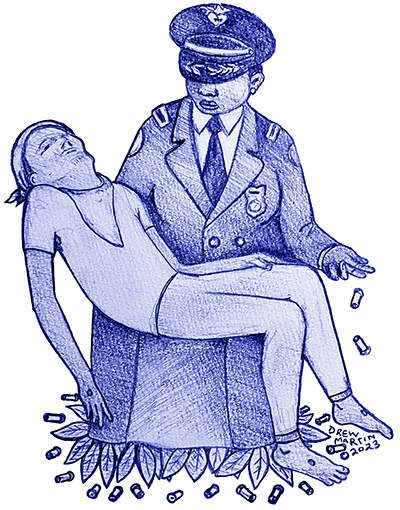Bob Dylan, The Philosophy of Modern Song (New York: Simon & Schuster 2022)
Somewhere in the yawning archives of WFMT Radio in Chicago is an ancient tape recording of a Bob Zimmerman/Dylan interview with the estimable Studs Terkel, which is utterly, inevitably, charmingly and teasingly fabricated. The encounter with the unfailingly genial Studs disclosed a rich fantasy life as told by Dylan’s painstakingly constructed imaginary persona, flourishing all the folk and hipster themes he carefully absorbed in his early years. Ever after, he was to refine this tendency, defining himself archetypally as a footloose “jokerman,” ever eluding the enveloping forces of conformity. The hot dusty road was not just a way out of the old Midwestern home town, it served as dramatic backdrop for the man’s endless self-mythologizing.

Dylan was born in Hibbing, Minnesota, a tough working town, and the vicinity of one of the largest open-pit iron ore mines anywhere. He hails from Turkish Jews who somehow wound up in the wilderness of Northern Minnesota. His father sold repurposed goods to the good working people of the town. Dylan in his childhood was spurred on – nay, obsessed with – the music he heard on the radio, signals from another and more alluring world. He washes out at the University of Minnesota after a year and hitchhikes on a bohemian mission to New York. Arriving in the ferment of the Village, he was, as the song says, a complete unknown, but he was not altogether without a direction home.
He devours Kerouac’s On the Road in 1957 and soon seeks out and encounters some of the Beats, Ginsberg chief among them. While at college he meets Paul Nelson of The Little Sandy Review, who possessed one of the great folk record collections, and he absorbs much of it. This cache sparks his Woody Guthrie obsession, which in turn adds a bit of heft to his nonstop legend-building exercise as an heir apparent to the Dust Bowl bard. Yet, at the same time, there has always been something rather gnome-like about Dylan. Early black-and-white photos disclose the face of a born Hasidic scholar, cheerfully “chained to the Torah.” He later does read Martin Buber’s magnificent Hasidic tales, which so fascinated Kafka, and quotes from the Hasidic parable, “The Seven Things You Can Learn from a Thief.” The Hasidic tendency puts him squarely in the tradition of rabbinical commentary, giving shape to the spiritual urges which improbably lead to evangelical Christianity at one point, which he seems to have abandoned or gone quiet about.
Mr. Dylan in his professional musician persona- a performer on an “endless” tour-will end with his demise (with his boots on.) Such an exit would be happily consistent with the myth Dylan created and continues to nurture. Our Nobel Prize winner prophet, who protests too much that he never wanted to be one, has written another book- though the word “written” may be stretching things a bit: The Philosophy of Modern Song comes in at a cool 45 dollars, and for the incorrigible fan there was a first purchase edition featuring Dylan’s autograph, initially using a mechanical signature device until people paying hundreds of dollars for a bogus autographed book complained, and the book’s were withdrawn and returned and Dylan may have actually been forced to sign them, for real. Woody Guthrie, that Okie Stalinist, who died in a State Hospital penniless must be spinning in his hero’s grave.
The book opens with a vague tribute to Doc Pomus the producer-lyricist-record business legend. The author then obligatorily thanks those “who did the right things at the right time” so that he could hear their works. Here is a man long acclimated to receiving paid help of the best kind. The songs covered, ad commented upon, range from Detroit City to Viva Las Vegas to the Fugs CIA man. It’s a decidedly mixed bag but at various points the book waxes mystical, spiritual, and sometimes just purely banal and bored takes on lyrics and music. Mention is made of Ricky Nelson, who died touring, having migrated from family TV (his entire family were the show) to Rock sainthood, and whose songs were aided and abetted by the legendary James Burton on guitar. Even Vic Damone, the heart-throb crooner of decades back, gets treated to some appreciative words.
If you were to be uninspired by Dylan’s prose on all and sundry, the book is interlaced and larded over with a tremendous array of photos and graphic images. The pix range from old sheet music covers to FSA style photos to graphic ad man fodder, to a glossy of Pete Seeger’s “Knee Deep in the Big Muddy” ( a song angrily lamenting abuse based on a boot camp tragedy in which recruits ill-led, and dead that also was infamously applied in time to characterize LBJ’s plight regarding Vietnam)
Dylan quotes some wag saying, “Sinatra was a thug transformed into a poet” but also himself opines sensibly enough that Johnny Cash had higher lyrical stakes to deal with, “life and death.” Yes much of this is hyperbole, but who can wrestle with the fact that all that radio, all that rock, all that showbiz, all that advertised myth got the kid out of Hibbing, long, long ago. He never looked back, and when it comes to this big heaping piece of celebrity bling – fobbed off as a toe of insights – neither should you.
Warren Leming is a writer-critic who divides his time between Chicago, Indiana, and Berlin. He is also a documentary filmmaker whose latest work examines the life and times of writer Clancy Sigal.

